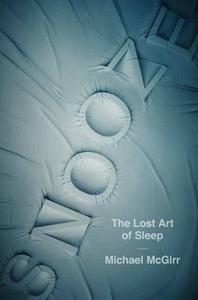
|
|
| photo: Bill Spierings | |
A former Jesuit priest, Michael McGirr is an essayist and prize-winning short story writer. His latest book, Snooze: The Lost Art of Sleep (Pegasus), is reviewed below.
Homer's Odyssey is a work that continues to provide fodder for comic strips and popular culture almost 3,000 years after it started to take shape (somewhat longer than the average life expectancy of books these days). The hero, Odysseus, leaves the rocky island of Ithaca, where he is king, and goes off to fight the Trojan war. He makes an appearance in Homer's prequel, The Iliad, where he has the clever idea of using a wooden horse to smuggle soldiers into the besieged city of Troy. Once the war is won, Odysseus has to get back home--and this is the plot of The Odyssey. A truly epic tale, our hero has more than his fair share of adventures over the course of the story. But perhaps most interesting is that, even with all the impressive exploits and so much at stake in various circumstances, at its root, The Odyssey is a book about getting home to bed.
It takes Odysseus quite a while to find his way home; by the time he gets back to Ithaca, he's been gone for 20 years. His queen, Penelope, has been waiting patiently all that time. For three of the years Odysseus is away, she keeps her eager suitors at bay by telling them that she can't possibly marry until she has completed the shroud for her father-in-law, Laertes. Every day, she works on it, crafting a "great and growing web." Then, every night, she stays awake, undoing the work she has done on the shroud that day, in order to give herself an excuse for the work continuing. It's as good a use for insomnia as the world has ever seen. Eventually, Odysseus does turn up in Ithaca, dressed in rags and looking like a beggar. Even Odysseus's identity is established by his bed. When Penelope requires proof that this stranger is her husband, she asks, within his earshot, for their bed to be moved. Only Odysseus would know that the request is impossible--he'd carved it himself in situ from the stump of an old olive tree whose trunk had taken centuries to reach the width of a pillar, and he built the walls of their chamber around it. When Penelope makes her request, Odysseus explains exactly why their bed can't be moved. And that's how she knows it's him.
Eventually, Odysseus does turn up in Ithaca, dressed in rags and looking like a beggar. Even Odysseus's identity is established by his bed. When Penelope requires proof that this stranger is her husband, she asks, within his earshot, for their bed to be moved. Only Odysseus would know that the request is impossible--he'd carved it himself in situ from the stump of an old olive tree whose trunk had taken centuries to reach the width of a pillar, and he built the walls of their chamber around it. When Penelope makes her request, Odysseus explains exactly why their bed can't be moved. And that's how she knows it's him.
Odysseus will clean out the suitors and be reunited with Penelope, of course. But what's interesting is the way the story is told. The point to which Odysseus returns is not his island, his throne or even his wife. The point toward which Odysseus has been traveling--through storm, disaster, bloodshed and confusion--is his bed.
The bed has roots deep in the earth. This is an evocative image, one which gives bedrock a literal meaning. Odysseus's bed is part and parcel of the rocky soil on which he was born. The entire world of his travels is anchored to it, and a quick flick through The Odyssey soon shows how carefully the theme of sleep is incorporated into the bones and sinews of the poem.
Odysseus's friend and guide among the gods, Athena, is the bringer of sleep. Odysseus gets into trouble at one point for sleeping without having made landfall; his ship is then blown back to square one and Odysseus must endure yet more suffering. Then, when Odysseus touches soil, he immediately drops into a deep, delicious sleep. Throughout the poem, Odysseus's moral stamina is seen in his ability to forgo false luxury in refusing beds that are not his rightful resting place. On his return to Ithaca, he first seeks shelter from Eumaeus, an old swineherd who has remained loyal throughout the king's absence. Though he doesn't know this stranger, Eumaeus still offers Odysseus his own bed. But our hero refuses, and sleeps outside. Hospitality, kindness to travelers and offering refuge are the timbers from which Homer built The Odyssey, a ship that is anchored to the wanderer's bed.
The point of The Odyssey is finding rest. It is curious that Western storytelling, a treasure trove of restlessness, a vast anthology of itchy feet, begins with a tale whose substance is so different. Of course, there is a lot of seepage between the ideas of finding rest and death. But the hero of The Odyssey is a guy who has cheated death. He has come home not to die but to sleep. He has come home to bed.

